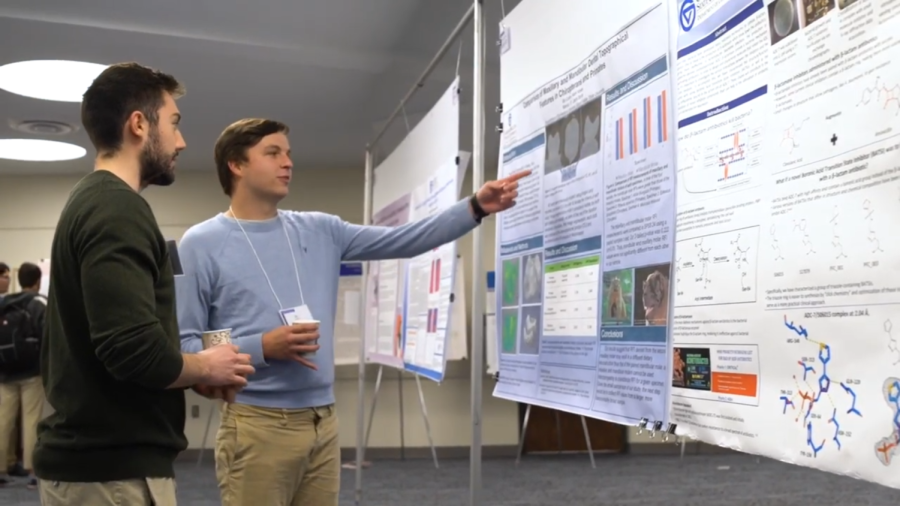Why undergrads should pursue research
Nov 1, 2021
At most universities, far more time, tools, and funding is put into research experience for graduate students than there is for their undergraduate peers. Grand Valley State University, however, has a wealth of resources available to students through the Office of Undergraduate Scholarship: undergrads can apply for summer research programs, get funding to present at academic conferences, become research assistants for faculty, and find many other opportunities that are more traditionally reserved for graduate students. But why might taking advantage of these resources be a good idea for an undergrad?
“Research can be a life-changing experience,” said Dr. Jennifer Moore, a Faculty Fellow at OURS. “It can really alter your perspective and introduce you to new interests. Sometimes it can even show you a new track for yourself: I have colleagues who started out in cancer research and ended up in wildlife biology research. Whatever you find, you’re still learning about the process of research, which is valuable wherever you go. And if you start out with something that you’re passionate about, even if it’s not the experience you thought you were going to have, you’ll still get something out of it.”
On Thursday, Oct. 28, Moore presented a webinar for GVSU students on why and how to get involved in undergraduate research.
“If you’re naturally a person who’s curious about the field that you’re in, and asking the kind of questions that you can really dig into, then absolutely research is something for you,” Moore said. “We often think about research as the STEM fields, and some humanities students might not think research is something that they can pursue. But the faculties in those fields are doing research too. Having that conversation with faculty and asking them what their research looks like can be eye-opening.”
Outside of getting first-hand experience in the mechanics of your field— whether that’s working in a lab, programming a neural network, conducting interviews or exploring historical archives— research can also be great for interpersonal goals, like learning more about future employment and graduate school, and developing relationships for letters of recommendation. Much of that comes from a student’s faculty mentor.
For students thinking about applying for a summer research program (like GVSU Library Scholars, Student Summer Scholars, or GVSU McNair Scholars), now is the time for the first step: thinking about what faculty members would be a good fit for your subject of interest.
“What I always tell people is that now’s the time to hone in on what you’re excited about,” Moore said. “Where do you want to go with your research? Identify faculty who are working in that area. That might mean sending them an email, it might be stopping by office hours. Regardless of how the question comes about, whether the student comes up with the research direction or the faculty, I think you as a student still need to find a faculty mentor who’s willing to guide you through that process.”
Once a student has an idea and a mentor, they can focus their interest on outlining the specifics of a project.
“What the application reviewers are looking for is, is it a good question you’re asking?” Moore said. “Is the project feasible within the time frame that you have? Even the summer research projects are a short amount of time in the grander scheme of research. The reviewers are looking for how you articulate the question, and whether it’s possible to answer it in the time that you have, with the resources that you have. Your mentor can guide you about what’s possible and what’s feasible, and the details of how a question like yours would be investigated in your field.”
Mentors aren’t the only way to find information about potential research projects. Students can also contact OURS directly (through their phone, 616-331-8100, or their email, [email protected]), in order to set up a research advising appointment, where they can talk to Director Susan Mendoza or a Faculty Fellow in order to plan their path forward. Those interested in the perspective of a student who’s gone through the process successfully can also arrange a conversation with the OURS Student Ambassadors, senior Noemy Parra-Cano and junior Lauren Proctor.
“I’ve had a number of undergraduate researchers over the years, in various programs and even just working with me for independent study credits during the school year,” Moore said. “I love working with undergrads. I’ve mentored a few different Student Summer Scholars, a modified 6-week Summer Scholar, a McNair Scholar, and a Beckman Scholar. Many have then gone on to grad school and gotten jobs in the field, and to me, that’s one of the most rewarding things, is to know that I helped them with an experience that launched them into that career. It’s really interesting to see where they end up— our students are doing some really cool projects, collecting interesting data, and publishing papers. It’s amazing to see what they do with their research.”






















